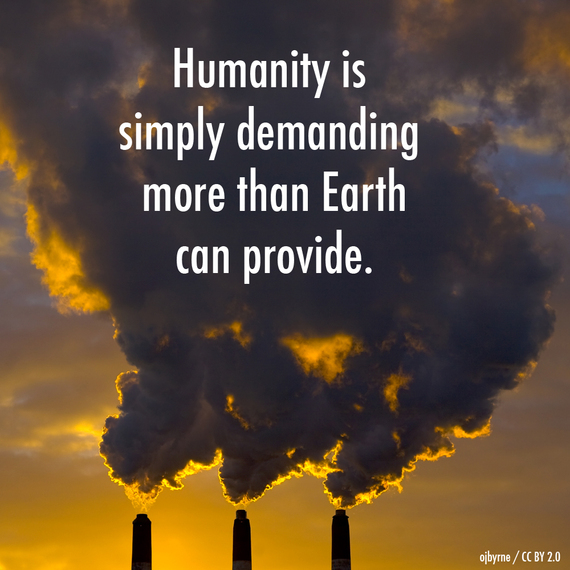How much productive land and sea area does it take to support your lifestyle?
Most Americans might be surprised to discover that it would take the ecosystems of 1.9 United States to regenerate the ecological resources U.S. residents use annually. Were Italy's residents to use ecological resources produced solely within their country's borders at their current rate, they would need 4 Italys. Japan's residents demand the ecological resources of 7.1 Japans. It would take 1.8 Indias to support India. Egypt uses the ecological resources of 2.4 Egypts, and China the resources of 2.5 Chinas.
These and scores of other "ecological debtor" countries use more of nature than exists within their own borders. They maintain their ecological deficits by depleting their own stocks of fish, trees, and other resources, and importing them from other countries -- all the while accumulating more and more carbon dioxide in the atmosphere and oceans.
Humanity has been outstripping the resources that Earth can renewably provide since the 1970s. We are in global ecological overshoot. According to Global Footprint Network's calculations, our annual demand for renewable resources and the services they provide is now equivalent to that of more than 1.5 Earths. The data shows us on track to require the resources of two planets well before mid-century.
Climate change -- a result of greenhouse gases being emitted faster than they can be absorbed by forests and oceans -- is the most obvious and arguably pressing impact of ecological overspending. But there are others -- shrinking forests, biodiversity loss, fisheries collapse, food shortages, higher commodity prices and civil unrest, to name a few. Humanity is simply using more than what the planet can provide. As per capita resource demand grows while global population increases, we endanger the quality of our lives, particularly those in vulnerable economies where environmental health is the limiting factor for sustainable human development.
There is still time to mitigate these resource risks. It's a question of making ecological limits central to decision making. But to create a one-planet future, we have to measure our impact on Earth.
Global Footprint Network is an international think tank working to advance sustainability through the Ecological Footprint, the world's premier resource accounting tool that measures how much nature we have, and how much we demand.
Conceived in 1990 by Mathis Wackernagel and William Rees, the Ecological Footprint quantifies every country's ecological resource demand (Ecological Footprint) against its supply (biocapacity). The demand calculation includes the land and sea area a population uses to consume resources, the ecosystems that absorb waste emissions, and the space used for buildings and roads. The supply calculation tracks how much biologically productive area is available to provide such ecological services.
The Ecological Footprint helps governments, investors, corporations and opinion leaders manage their ecological capital -- both now and for the future -- and establish strategies to guide policies that advance sustainable development within Earth's ecological capacity. Global Footprint Network works to make resource accounting as commonplace as tracking GDP, employment, and debt:
- Just as balance sheets track income and expenditures, our annual National Footprint Accounts quantify every country's Ecological Footprint, documenting whether we are living within our ecological budget or consuming resources faster than the planet can renew them. (Curious about the Ecological Footprint of your country? Our Country Trends graphs track patterns of resource demand and availability since 1961.)
- Our Human Development Initiative strives to meet human needs while maintaining natural capital.
- Our Competitiveness 2.0 Initiative aims to redirect billions of dollars of investment flows toward making sustainable human development a reality.
- Our Finance for Change Initiative leverages the finance industry and capital markets to shift national government policies and investments in a more sustainable direction.
- Our Earth Overshoot Day campaign sparks a global dialogue about how we can facilitate a one-planet future.
During Global Footprint Network's 10-year history, we've engaged with 57 national governments on six continents. Eleven governments have institutionalized the Ecological Footprint as an official metric. WWF International's biennial Living Planet Report highlights the Ecological Footprint of 150 nations. The United Nations Development Programme's Human Development Report 2013 combines its Human Development Index (HDI) with the Ecological Footprint to measure the human well-being that countries generate. The Bertelsmann Foundation's Intergenerational Justice Index (IJI) integrates the Ecological Footprint with other indicators. The Ecological Footprint also serves as the denominator in the new economics foundation's (nef) Happy Planet Index calculation. And every year, more than a million people around the world use our individual Ecological Footprint calculator to measure their own Footprint.
Global Footprint Network has received international recognition from the Blue Planet Prize, Zayed International Prize for Environment, and others. As Skoll Awardees for Social Entrepreneurship, we're currently participating in the Social Entrepreneurs Challenge campaign. Donations to Global Footprint Network support projects like our National Footprint Accounts; mobile app development of our Footprint calculator; and the launch of Earth Overshoot Day outreach campaigns. Your support will help us reach our one overarching goal: A sustainable future in which all people have the opportunity to live satisfying lives within the means of one planet.
Haley Smith Kingsland, Media & Outreach Associate, Global Footprint Network
